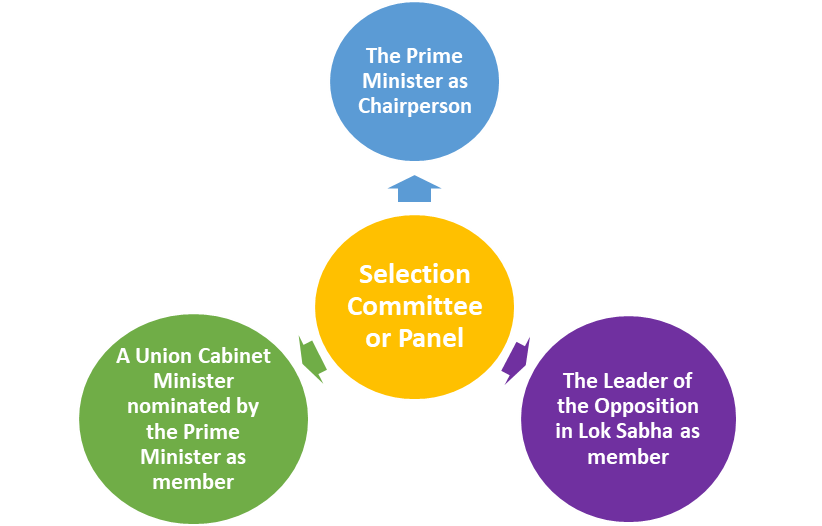Why in News?
Recently, the Union Government of India introduced a bill in the Rajya Sabha to change the process of appointing the
Chief Election Commissioner (CEC) and Election Commissioners (ECs).
- The Bill seeks to remove the Chief Justice of India (CJI) from the selection committee to select the CEC and ECs.
- It repeals the Election Commission (Conditions of Service of Election Commissioners and Transaction of Business) Act, 1991.
Key Points of the Bill:
- Selection Committee/Panel: The Selection Committee will consist of:
Note: If the Leader of Opposition in Lok Sabha has
not been recognised, the leader of the single largest opposition party in Lok
Sabha will assume the role.
- Search Committee: A Search Committee will prepare a panel of five persons for the consideration of the Selection Committee. The Search Committee will be headed by the Cabinet Secretary.
- Qualification of CEC and ECs: Persons who are holding or have held posts equivalent to the rank of Secretary to the central government will be eligible to be appointed as CEC and ECs. Such persons must have expertise in managing and conducting elections.
- Term of office: The 1991 Act mandates that the CEC and other ECs will hold office for a term of six years or until they reach the age of 65 years, whichever is earlier. If an EC is appointed as the CEC, his total term cannot exceed six years. The Bill retains the same tenure. Further, under the Bill, the CEC and other ECs will not be eligible for re-appointment.
- Removal and resignation: Under Article 324 of the Constitution, the CEC can only be removed from his office in a manner similar to that of a Supreme Court judge. This is done through an order of the President, based on a motion passed by both Houses of Parliament in the same session.
The motion for removal must be adopted with:
(i)
majority support of total membership of each
House, and
(ii)
at least two-thirds support from members present
and voting.
An EC can only be removed from office on the recommendation
of the CEC. The Bill retains this
removal procedure.
- The 1991 Act provides that the CEC and other ECs may submit their resignation to the President. The Bill has the same provision.
About the Election Commission of India:
- The Election Commission of India is an autonomous constitutional authority responsible for administering election processes in the country.
- According to Article 324 of the Constitution,
- The Election Commission consists of the Chief Election Commissioner (CEC) and such number of other Election Commissioners (ECs), as the President may decide.
- The CEC and other ECs are appointed by the President. The CEC and other ECs will be appointed by the President on the recommendation of a Selection Committee.
- Existing Selection Committee/Panel: The Selection Committee will consist of: (i) the Prime Minister as Chairperson, (ii) the Leader of the Opposition in Lok Sabha as member, and (iii) the Chief Justice of India (CJI).
- It oversees elections to the Lok Sabha, Rajya Sabha, State Legislative Assemblies, and the offices of the President and Vice President in India.
- The commission plays a crucial role in maintaining the fairness and transparency of elections, ensuring a level playing field for political parties and candidates, and upholding the democratic process.
- It enforces the Model Code of Conduct, manages voter registration, supervises polling stations, and addresses election-related disputes.
- The effectiveness of the Election Commission is often assessed based on its ability to conduct free and fair elections and its impartiality in dealing with electoral matters.
|
Q. Consider the
following statements: (UPSC 2017) 1.
The
Election Commission of India is a five-member body. 2.
Union
Ministry of Home Affairs decides the election schedule for the conduct of
both general elections and bye-elections. 3.
Election
Commission resolves the disputes relating to splits/mergers of recognised
political parties. Which of the statements given
above is/are correct? a)
1
and 2 only b)
2
only c)
2
and 3 only d)
3
only Answer: (d) |


Post a Comment
Post a Comment
Thanks...keep in touch 🤟